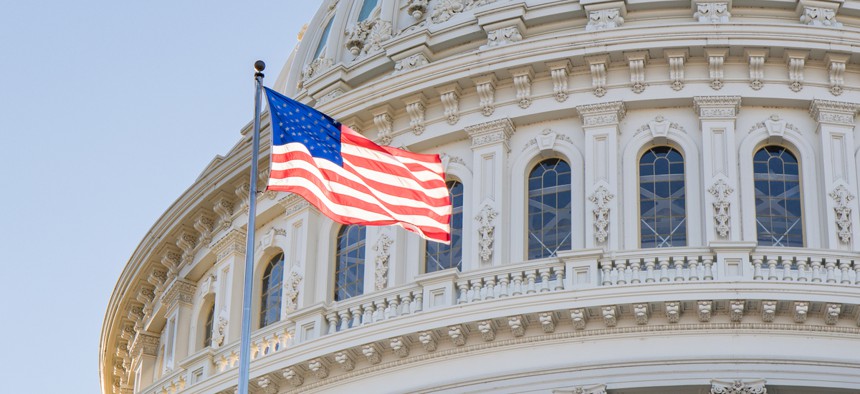House Appropriators Add Support for FedRAMP, 5G and Chinese Telecom Bans to Spending Bill

Becky Wright Photography/Shutterstock.com
The committee also suggested adding another $25 million to the Technology Modernization Fund.
The House Appropriations Committee voted Wednesday to move its 2021 budget proposal for Financial Services and General Government, including funding for the governmentwide Technology Modernization Fund and some last-minute amendments on 5G, Chinese telecommunications equipment and the Federal Risk and Authorization Management Program.
Overall, the bill—which covers the Treasury Department and operational agencies like the Office of Management and Budget, the Office of Personnel Management and the General Services Administration, among others—includes $24.64 billion, $808 million more than allocated for fiscal 2020.
The bill was passed out of committee Wednesday by a vote of 30-22.
Once again, appropriators started the debate on allocations for the Technology Modernization Fund—a central pot of money loaned to federal agencies for specific, impactful IT modernization projects—at $25 million.
The administration, as with years past, requested $150 million in the president’s budget proposal. But, year after year, House appropriators offered to boost the fund by only $25 million.
“The committee encourages GSA and the TMF Board to prioritize and fund those projects that have the most significant impact on mission enhancement and that most effectively modernize citizen-facing services,” appropriators wrote in the bill report, “including updating public facing websites, modernizing forms and digitizing government processes.”
In years past, the Senate has followed up by zeroing out any increase in its proposal. During conference between the chambers, Congress has opted to stick with the $25 million increase.
If this year’s proposed $25 million increase is approved, it will raise the fund’s cap to $175 million.
That funding will be used to support several projects, though the TMF program management office and governing board would like the fund to be much more robust.
A recent report by the Government Accountability Office showed the program office was not on track to be self-sustaining based on the current administrative fee structure. One of the primary reasons cited by GAO, the program office and the OMB was a dearth of funds, as more money going out to projects means more administrative fees to collect.
The current appropriations proposal would increase the fund, but not to level the administration would like. According to GAO, the fund would need at least $438 million to be fully self-sustaining.
During Wednesday’s markup before the full committee, Rep. Mike Quigley, D-Ill., chair of the Financial Services and General Government Appropriations Subcommittee, offered several technical changes, with some IT-focused changed tucked in. The amendment was agreed to on a voice vote.
The Quigley amendment inserted language urging the administration to spur development of 5G networks “that are accessible nationwide, including rural communities, and that are developed using technology and equipment that is verified to be secure from foreign surveillance or influence.”
With regard to the last point, the insert is followed by support for banning Chinese telecom companies Huawei Technology and ZTE from those networks.
“The committee encourages the [Federal Communications Commision] to continue working to ban the use of such funds to purchase, obtain, or maintain any equipment or services produced or provided by companies posing a national security threat to the integrity of communications networks or the communications supply chain within the United States,” the amendment states. “Furthermore, the committee continues to support agency wide efforts to prevent and expel communications technology companies from operating within the United States that are known to have substantial ties to foreign state-owned enterprises that conduct surveillance on and collect the data of American citizens on behalf of a foreign government, participate in the theft of American intellectual property, assist in espionage activities for foreign governments, have cybersecurity risks and vulnerabilities in their equipment, or face ongoing congressional and executive branch concerns about their business models and practices.”
The amendment also reiterates the committee’s support for FedRAMP, a GSA-based program that certifies the cybersecurity of commercial cloud products using standards from the National Institute of Standards and Technology.
“The committee continues to support efforts by the FedRAMP to empower federal agencies to use modern cloud technologies,” the amendment states, adding that the current pandemic raises the importance of ensuring the security of these technologies.
“The committee recognizes that these efforts must be prioritized governmentwide in order to ensure the effective security of federal information impacting millions of civil servants and taxpayers nationwide, particularly in light of the ongoing COVID-19 pandemic which had intensified the cyber vulnerability of the federal cloud services network,” the amended language reads.
While the Quigley amendments showed support for these federal IT initiatives, none of these changes included additional funding.
NEXT STORY: FCW Insider: July 15






